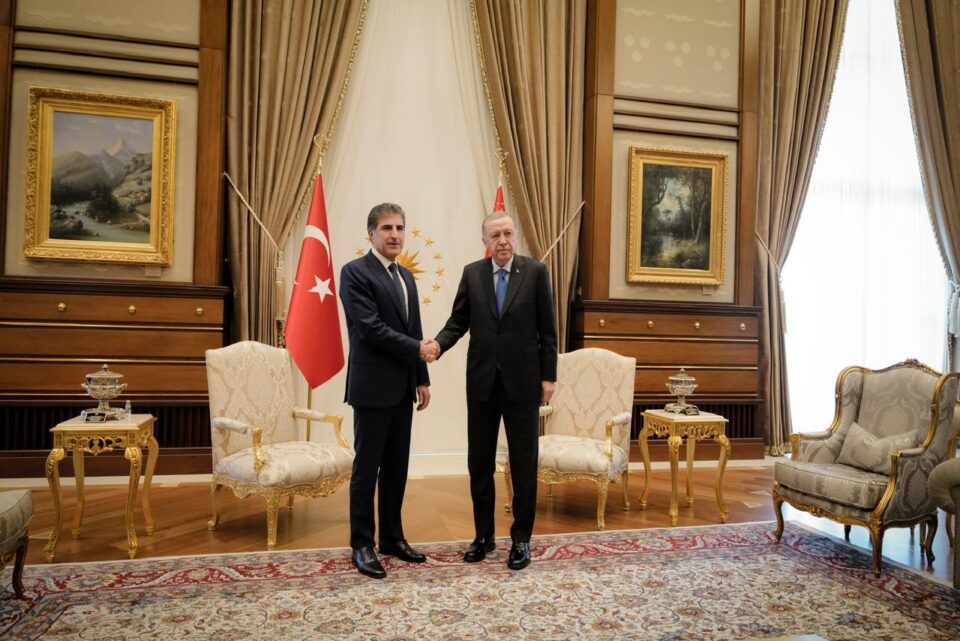By Jawad Qadir
Turkey Visit Hints at New Kurdish Peace Initiative
In a significant diplomatic development that could herald a new approach to Turkey’s longstanding Kurdish issue, Kurdistan Region President Nechirvan Barzani made an unexpected visit to Ankara for high-level meetings with Turkish leadership, including President Recep Tayyip Erdogan, Foreign Minister Hakan Fidan, and National Intelligence Organization (MIT) Chief Ibrahim Kalin.
The unscheduled nature of the visit, occurring just days before Kurdistan Region’s parliamentary elections, has sparked widespread speculation about Turkey’s potential new initiative to address its Kurdish question, particularly as it coincides with growing discussions about reviving peace talks that stalled nearly a decade ago.
During the meetings at the Presidential Complex in Ankara, while official statements emphasized regional security, bilateral relations, and economic cooperation, sources familiar with the discussions suggest the conversations may have broader implications for Turkey’s future Kurdish policy. The timing and context of these meetings have led analysts to view them as potentially signalling a shift in Ankara’s approach to Kurdish issues both domestically and regionally.
Turkey’s Diplomatic Shift: Barzani’s Role in Regional Reconciliation
Nechirvan Barzani’s role in Turkish-Kurdish relations carries historical significance. During the early 2010s, he played a pivotal role in Turkey’s previous peace process with its Kurdish population, providing strong support for then-Prime Minister Erdogan’s democratic resolution efforts. This historical context adds weight to the current discussions, with many observers viewing his present engagement through the lens of his past mediation efforts.
Sedat Yurtdas, Deputy Chairman of the Dicle Social Research Center (DITAM), suggests that Turkey has reached a critical juncture in its approach to Kurdish issues. “Turkey finds itself in a position where it must develop relations with Kurdish entities across the region, including those in Syria, Iraq, and within Turkey itself,” he noted, highlighting the growing recognition in Ankara that the Kurdish issue cannot be indefinitely postponed.
The timing of these discussions is particularly significant given the current regional context. With the Israeli-Hamas conflict threatening to escalate into a broader regional crisis, Turkey appears to be reassessing its strategic positions. Nechirvan Barzani had previously attempted to mediate between Turkey and the Syrian Democratic Forces (SDF), though these efforts were unsuccessful due to Turkey’s rigid stance at the time.
Mustafa Sefik, a political analyst based in Erbil, emphasizes the strategic importance of Iraqi Kurdistan in Turkey’s regional Kurdish policy. “While a complex and historical issue like the Kurdish question cannot be resolved in a few meetings, these discussions can contribute to building a foundation for a solution,” he says. Sefik views the Kurdistan Region as Turkey’s most crucial link in its relations with Kurdish populations across the region.
Regional Tensions Drive New Turkish-Kurdish Dialogue Amid Middle East Crisis
The regional context adds another layer of complexity to these discussions. With the possibility of the Israeli conflict expanding to involve Iranian-linked groups in Iraq and Syria, there’s growing recognition in Ankara that regional power structures could undergo significant changes, particularly in Syria where Kurdish interests play a crucial role. This evolving situation may be pushing Turkey to reconsider its approach to Kurdish issues as part of a broader regional strategy.
While the Turkish presidency’s official statement following the Erdogan-Barzani meeting focused on bilateral relations, regional developments, and the Development Road Project – a major infrastructure initiative linking the Gulf to Turkey through Iraq – analysts are particularly interested in the unspoken aspects of the visit.
The KRG’s official stance has been notably measured, with officials neither confirming nor denying speculation about a new peace initiative. However, the timing of Barzani’s visit and the current regional context suggest that Turkey may be preparing for a significant shift in its approach to Kurdish issues. As Sefik observes, “Turkey appears to be preparing itself for regional reorganization, and in any new regional design, Turkey wishes to have a say.”
This potential new peace initiative comes at a time when Turkey faces multiple challenges both domestically and regionally. The changing dynamics in Syria and Iraq, coupled with the need for regional stability, suggest that Barzani’s visit might represent more than routine diplomacy. It could mark the beginning of a new chapter in Turkey’s approach to one of its most enduring political challenges.
The success of any new initiative would largely depend on Turkey’s willingness to engage in meaningful dialogue and the ability of various Kurdish actors to present a unified approach. Barzani’s role as a potential mediator, given his previous experience and current position, could prove crucial in bridging the gaps between various stakeholders.
As regional tensions continue to evolve and Turkey seeks to maintain its influence in an increasingly complex Middle East, the outcome of these discussions could have far-reaching implications for both Turkish-Kurdish relations and regional stability. Whether this diplomatic engagement will lead to a substantive new peace process remains to be seen, but the very fact that such high-level discussions are taking place signals a potential shift in Turkey’s strategic calculations regarding its Kurdish policy.

